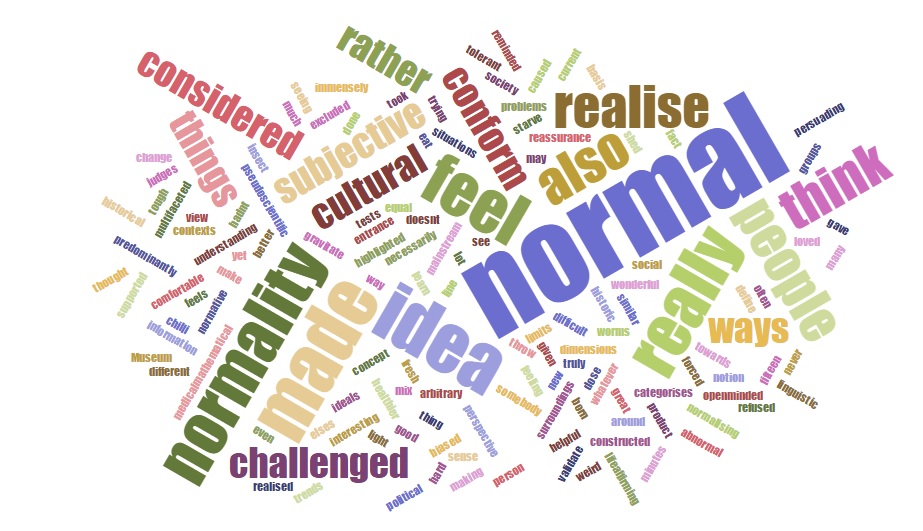This is a post by Sarah Chaney and Helen Stark, both project managers in the Centre for the History of the Emotions.
‘I realised how normative, pseudo-scientific the idea of normal can be… Also that normal doesn’t necessarily equal healthier or better. There is a very subjective and biased sense of what normal is or should be.’
So commented one attendee at our drop-in late, the Museum of the Normal, a public event designed to address the history of being and defining normal. We wanted to measure whether there was a change in attitudes and the quotation above, taken from a follow-up survey, shows how this person’s perception of normality shifted – we might say, became more critical – as a result of the event.
We used 20 spot interviews on the night and a follow-up online survey, completed by 44 people, to assess responses to ‘The Museum of the Normal’. In the spot interviews, participants commented on activities they had enjoyed, but only a few looked at the wider concept of challenging what is normal and how this might change in different cultures and time periods. However, the follow-up survey showed much more reflective thinking. It might be that reflection was needed before changes in thinking could occur, or that those responding represented a different section of our audience or were reluctant to confess to a naivety about normativity in person.
I tell you what’s interesting about it, if you think about cultural norms and then like personal norms, and all the other, like, norms, then there must be some sort of like hierarchy, I don’t know, which overrides stuff. I don’t know, it’s just making me think about other stuff. So if you think it’s normal to go out on a Saturday night and have a few beers you know in some cultures they think that’s a bit weird, right, so that’s abnormal in that culture. But personally that’s ok. And culturally, like in Britain, that’s what we like to do, we like to go to the pub on Saturday, don’t we? So it, it’s quite interesting when you start to think about it in those terms. (transcribed from spot interview)
The results of our follow-up survey provide strong and cumulative evidence that participants experienced a change in attitude about ideas of the normal and healthy as a result of attending the event. One attendee commented ‘[The event] challenged my view immensely. Being normal is multi-faceted.’ Another wrote ‘It made me think about the historic concept of “being normal”, which I hadn’t really done before.’ In both the follow-up surveys and the audio interviews from the evening itself, participants reflected on the extent to which what is ‘normal’ is culturally constructed: ‘It highlighted how subjective normality is and how current trends are born out of cultural contexts rather than having any basis in hard fact. It was helpful to be reminded of this, making me feel more comfortable in being myself, whatever that is, rather than trying to conform to some constructed idea of how I should be.’
Participants in the follow-up survey also indicated that the event had make them think more both about where our ideas of what is “normal” or “healthy” come from and the role of medicine and psychology in creating these norms. ‘It made me realise how difficult it is to define ‘normal’! While I had some understanding of it from a medical/mathematical perspective, it was really interesting to throw social, cultural, historical and linguistic ideals into the mix too – and realise that there really is no such thing as truly “normal”.’ ‘I realised how normative, pseudo-scientific the idea of normal can be… Also that normal doesn’t necessarily equal healthier or better. There is a very subjective and biased sense of what normal is or should be.’
Some audience feedback also supported the contention that challenging the emotional nature of normality is helpful – and can even be therapeutic. ‘It shed light on fresh dimensions of being, and not being, normal; how, in some ways, it is normal not to be normal. I feel it would have given reassurance to people who may often feel excluded from the mainstream.’ ‘It made me think that normality is a product of your surroundings – you gravitate towards situations or groups of people that are in some way similar to you, so you feel normal around them. A lot of problems have been caused by people being or feeling forced to conform to somebody else’s idea of normal.’
From audience feedback after the event, it was clear that a number of visitors had reflected on the themes of the event, considering where our ideas of what is normal and healthy come from, and how these change historically and across different cultures.
Want to know more? Read other posts about ‘The Museum of the Normal’ or listen to our Psychic Driving audio track.



